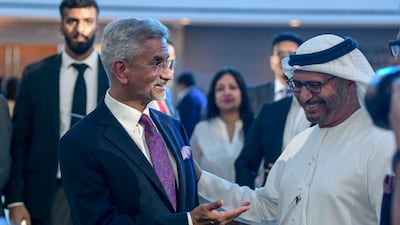Indian External Affairs Minister Subrahmanyam Jaishankar has criticised developed countries for backtracking on promises to help nations vulnerable to the effects of climate change.
The minister said countries were “not sincere” when it came to climate justice that seeks to compensate poorer countries battered by climate change.
“Those who are occupying the carbon space have kept promising that they will help others, but frankly they have kept short-changing the world,” the minister said on Monday during the second India Global Forum (IGF) held at Abu Dhabi Global Market.
“They come up with some excuses or arguments that keep kicking the can down the road."

Dr Anwar Gargash, Diplomatic Adviser to President Sheikh Mohamed, also attended the panel that discussed the changing geopolitics and the role of India-UAE relations as "partners of global impact" — the theme of the four-day conference.
While many countries are charting a timetable for climate action to promote sustainable growth, the Indian minister said there was growing frustration that the same countries were “not willing to walk the walk” on climate justice.
During every climate summit, the same issue is raised but countries find ways to scuttle it, he added.
“So, somewhere people need to be truthful about it and say who is really responsible for global warming, and the countries which are need to step up.
“This is one of the big issues the world is grappling with. But global conversations are one-sided on this.”
Last month, Cop27 in Sharm El Sheikh concluded with an agreement to form a loss and damage fund — long resisted by the US and EU countries — to help poorer nations badly affected by climate change. It was lauded as a breakthrough in acknowledging the social and financial inequities faced by climate-vulnerable nations that share a bigger impact of devastating natural disasters. The working mechanisms of the fund are not yet spelt out and it is assumed that it could take several years before the fund will come to exist.
Need for more efficiency
Dr Gargash, who shared the panel with Mr Jaishankar, said climate justice was essential.
“You cannot tell various countries that they [can no longer] develop infrastructure and economic mobility of their population because they missed the boat," he said. "That is totally unacceptable.”
He said the international system was not “as effective and as quick as it should be” in addressing the ravaging effects of climate change.
He said the UAE, which will host Cop28 next year, will try to move more expeditiously while addressing these concerns.
“We know we are slipping on commitments that were made in Paris. This is something we work diligently together to address,” said Dr Gargash.
The UAE is one of the 196 signatories of the climate change treaty adopted at Cop21 in Paris in 2015, which aims to limit global warming to pre-industrial levels of 1.5°C.
While the UAE is committed to achieving net zero by 2050, and is investing heavily in solar and other forms of clean energy, Dr Gargash said the country was taking a balanced approach.
“We have been trying to be realistic while we are focused on sustainable energy taking a larger part in the energy mix," he said.
"But we also understand that there is lot of turbulence that is affecting the global economy because there has not been enough investment in oil and gas.
"Both of these things need to move in parallel.”


